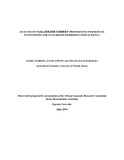| dc.contributor.author | Oluoch-Kosura, W | |
| dc.contributor.author | Otieno, D | |
| dc.contributor.author | Ochieng, I | |
| dc.date.accessioned | 2014-07-02T07:44:22Z | |
| dc.date.available | 2014-07-02T07:44:22Z | |
| dc.date.issued | 2014 | |
| dc.identifier.citation | Presentation at the African Economic Research Consortium theses dissemination workshop Egerton Unversity | en_US |
| dc.identifier.uri | http://hdl.handle.net/11295/71573 | |
| dc.description | A brief Presentation | en_US |
| dc.description.abstract | Poverty continues to be a problem in some parts of the world and is typically severe among small-scale farmers. If this issue is not addressed, farmers will continue to fall into poverty thereby stifling the achievement of Kenya Vision 2030’s plan to transform the country to middle income status by 2030. Biofuel investments are emerging as a possible alternative livelihood diversification strategy. However, little is known on farmers’ preferences for biofuel investments. Given Kenya’s Agricultural Sector Development Strategy (ASDS) 2010-2020, it was important to analyze smallholder farmers’ livelihood strategies and preferences for biofuel investments in terms of how they should be designed so as not to stifle ASDS vision of ensuring a food secure and prosperous nation. Specifically, the study focused on characterization of smallholder farmers’ livelihood strategies and preferences for biofuel investments. The survey data was generated from a multistage area sample of smallholder farmers in Western Kenya. Descriptive statistics were used in the characterization of smallholder farmers’ livelihood strategies. Further, the Choice Experiment (CE) approach and the Random Parameter Logit (RPL) were used to elicit farmers’ preferences for biofuel investments.
Pooled results from the preference analysis indicated that farmers had higher preference for short contract length compared to long contract length. In addition to this, farmers had a higher preference for quarter piece of land to be leased out compared to three quarter piece of land to be leased out. Also, they had higher preference for permanent type of employment compared to casual type of employment. Lastly, farmers in both areas had a higher preference for renewable contracts compared to non-renewable contracts. The study also estimated Compensating Surplus (CS) measures, which indicated that farmers in Kakamega are willing to accept higher compensation compared to their counterparts in Bungoma for them to participate in biofuel investments. These findings offer useful insights to policy-makers on the design of biofuel investments to address the livelihood challenges in Western Kenya and other areas with similar conditions. | en_US |
| dc.description.sponsorship | University of Nairobi | en_US |
| dc.language.iso | en | en_US |
| dc.publisher | Agricultural Economics, University of Nairobi, | en_US |
| dc.subject | Biofuel investments | en_US |
| dc.subject | Poverty | en_US |
| dc.title | Analysis of smallholder farmers’ preferences for Biofuel investments for livelihood diversification in Kenya | en_US |
| dc.type | Thesis | en_US |

